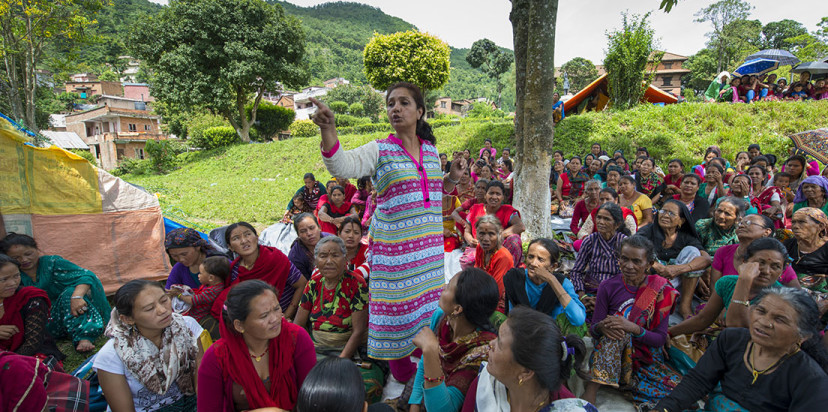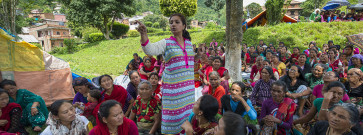Five months post-quake, what’s next for Nepal
Published on: September 11, 2015

Lily Thapa founder of Global Fund for Women grantee partner Women for Human Rights, pictured in Ghorka, Nepal, where she has established temporary shelters and relief for women at the Ghorka Museum camp.
On April 25, a 7.8-magnitude earthquake rocked Nepal, levelling entire villages and killing thousands. Just a few weeks later, a second major quake occurred. Then, in June, the monsoon season began. Heavy rainfall inundated the country; since many homes and structures had collapsed completely, people in Nepal struggled to form makeshift shelters to keep dry.
But five months post-quake, there is a silver lining. Global Fund for Women’s Nepal Crisis Fund received more than $700,000 in donations—more than any other crisis fund in Global Fund for Women’s 27-year history. Our grantee partners working on the ground in Nepal to address the immediate needs of women and girls during the relief efforts are seeing tremendous progress, and are now looking at long-term priorities for the recovery.
“At this point we feel what the community needs most is healing from the trauma and encouragement,” says Yelisha Sharma, Communications Director for Tewa, a women’s fund and Global Fund for Women grantee that has been investing in women’s rights groups in Nepal since 1996. “As we’ve seen first-hand, women need to know that someone has their back.” Immediately after the quake, Tewa provided urgently-needed support for women and children, giving them tarps, food, medicine, sanitary pads, and maternity packages. Now that the immediate needs have been met, Tewa has designed a program called “Barefoot Volunteers” to begin addressing long-term recovery. “As far as long-term recovery our strength of Tewa is that we have grantees actually out in the field so we can see what people need directly,” says Yelisha. “These volunteers work directly with families in the field in whatever capacity where the families need help and healing; through counseling or watching the children, cooking, working in the fields.”
Grantee partner Loom also used crisis funding from Global Fund for Women. “We have always distributed dignity ‘Women Kits’ that include things a pregnant woman or new mother might need, such as baby massage oil, toothpaste, a gown, lentils, rice, beans, sanitary pads, baby shawl, newborn baby clothes, milk, or bottles. As part of our earthquake relief we added a small plastic bucket and mosquito netting,” says Gita Thapa, Communications Officer at Loom, adding that Loom has provided nearly 5,000 women with such kits as well as much-needed mosquito nets.
Dignity kits are a core part of Global Fund for Women grantee partner Beyond Beijing Committee’s relief packages, and they have been distributing adolescent kits to teenage girls as well, which include sanitary pads, soap, and panties, among other necessities that have been difficult to find since the quake. Beyond Beijing Committee’s Program Manager, Ruby Shakya, explains that with the success of the safe space for women that they opened following the earthquake in Thimi – where they are teaching women to make sanitary pads from a local tailor for their personal use and to potentially sell in local markets – they are hoping to replicate the model by opening additional safe spaces in other hard-hit places. “We hope to get the funds to open one in Kathmandu next, where 800 homes were destroyed and women are now living in tents. We’d like to then open one in Kavre. They also want women friendly space,” says Ruby. Still, some challenges remain, and women often bear a heavier burden than they had before the quake. “After the earthquake the women not only lost their houses but they lost their income as many of them ran small businesses from their homes,” says Bandana Rana, founder of Global Fund for Women grantee partner Saathi (‘friend’ in Nepali). Saathi runs a shelter for women and offers medical and legal services and job trainings. “A woman’s workload has at least tripled since the earthquake, as they now work to help clean up the debris, and have had to learn and partake in the rebuilding of their homes. They have to walk further to find a supply of clean water on top of cooking for the family and caring for the children. Meanwhile many men have reverted to drinking alcohol to cope with their stress.”
Moving forward, our grantee partners are looking to continue and expand their recovery efforts, including for skills trainings and income-generating activities for earthquake survivors as a key long-term rehabilitation goal. Many will be working with particularly marginalized communities of women such as Dalit women (lower caste women who often face discrimination), trafficking survivors, women who have recently given birth, single women, and women-led households. Several grantee partners will also focus on addressing reproductive health needs and the heightened risk of sexual violence, providing self-defense trainings for women and girls, opening shelters and safe spaces for women, and supporting survivors with psychological and health services.
Global Fund for Women remains committed to advancing women’s human rights in Nepal, especially in light of the protests over the new planned constitution that turned violent in August. As our grantee partner the Women’s Rehabilitation Center (WOREC) emphasizes, “many civil and political rights have been curtailed,” adding that there are particular threats to women’s human rights defenders. One of the group’s own staff was attacked by security forces during an August 29th street protest. Research and Global Fund for Women experience shows that post-disaster recovery and rehabilitation holds the greatest potential and greatest risk for protecting and sustaining gender equality – and this violence only increases the risks. The resilient women recovery in Nepal are critical to ensuring women’s human rights are advanced in the new constitution. They are also educating and empowering women and girls to demand their rights – to ensure that after the crisis, women’s rights are strengthened and not diminished.
Story From: Nepal Earhquake Story






